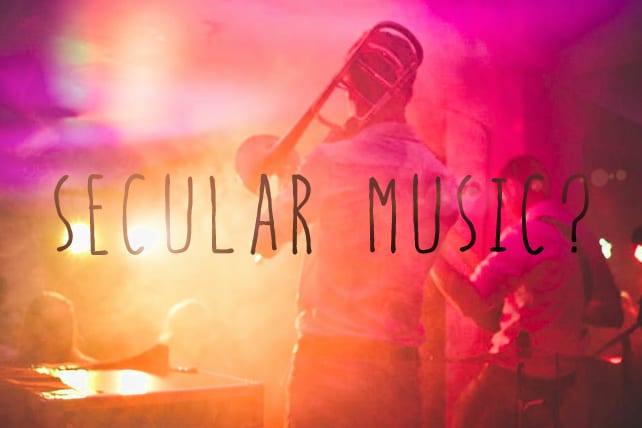Matt sent in this question regarding secular music in church:
I recently came across a message board where folks were discussing secular songs that could be done to make “seekers” feel more comfortable at church. Some folks mentioned that they had been to churches where songs were used such as: “She Will Be Loved” by Maroon 5, “Your Body Is a Wonderland” by John Mayer (that Sunday’s service was about sexuality), lots of U2, etc. I’m really interested to hear your thoughts about doing songs like these. Should we seek to evangelize during our times of worshiping God through singing corporately?
Secular Music in Church?
There are three ways I want to respond to Matt’s question about secular music in church.
First, the idea that we should make “seekers” feel more comfortable in church begs for further clarification. We should make sure that unbelievers can understand what’s going on in our meetings and that we’re not doing anything to make them feel unwelcome. But it’s not our responsibility to make sure they’re “comfortable.” The church is different from the world. We’ve gathered to build each other up by rehearsing and celebrating the Gospel, calling to mind God’s covenant promises, confess our sins, exercise spiritual gifts and much more. “To each one is given the manifestation of the Spirit for the common good” (1 Cor. 12:7). I wouldn’t expect someone who doesn’t know the Savior to be totally comfortable in that setting. Our primary goal is to make sure that unbelievers have the opportunity to encounter in some way the grace and truth of God revealed in Jesus Christ, expressed through his church.
Second, singing/playing popular secular songs on Sunday mornings can have a number of effects, some good, some not so good. What are people hearing as these songs are being played? Are they thinking, “Wow, these Christians really relate to me?” Or are they thinking, “Gee, I never knew Christians listen to the same kind of music I do. We’re really not that different!” Or are they thinking, “Why are these Christians trying to act so much like me? I was hoping they could provide some answers to my problems.” Or maybe, “Why do I come to church to hear second-rate versions of songs I listen to? Why don’t they sing about something that has changed their lives, rather than something I already know?” Hard to say. I certainly have no idea why someone would sing John Mayer’s “Your Body Is a Wonderland” on a Sunday morning. Here’s a portion:
We got the afternoon, you got this room for two
One thing I’ve left to do, discover me discovering you
And if you want love, we’ll make it
Swim in a deep sea of blankets
Take all your big plans and break ‘em
This is bound to be awhile
Your body is a wonderland
Your body is a wonder (I’ll use my hands)
Your body is a wonderland
If reading those words seems awkward here, imagine what it would sound like if they’re sung when the church of Jesus Christ gathers. Sexuality is a gift from God to be celebrated within the covenant of marriage. “Let marriage be held in honor among all, and let the marriage bed be undefiled” (Heb. 13:4). This song doesn’t accomplish those goals. There’s no sense that this is a husband singing to his wife, and even if it were, it wouldn’t be appropriate for a multiple generation congregation. Also, prior associations people can have with the song make it even more problematic. Seems like it would be much better to simply reference the words and comment on them.
Third, Matt asks if we should seek to evangelize non-Christians during our times of corporate worship. Absolutely. Is playing songs by U2 or other popular artists the best way to do that? No. Evangelism involves proclaiming the Gospel—the good news that Christ died in our place for our sins to reconcile us to God. Evangelism should be the natural overflow of a group of Christians who are passionately, clearly and compellingly extolling the greatness of God and his mercy in Jesus Christ—not trying to sound like the world. That doesn’t mean we can never use secular music in church to make a specific point in a meeting. Or that it isn’t wise at times to reference what the world is singing. But there are dangers in making singing secular songs on a Sunday morning a regular practice. Songs speak not only through their lyrics but also through the associations people make with them. We should be very intentional about the use of popular songs, and our motive should be to communicate truth, not simply to be “relevant” or attract more people. If we’re not careful, the means we use to draw others will hinder them from hearing the very message that could set them free.













